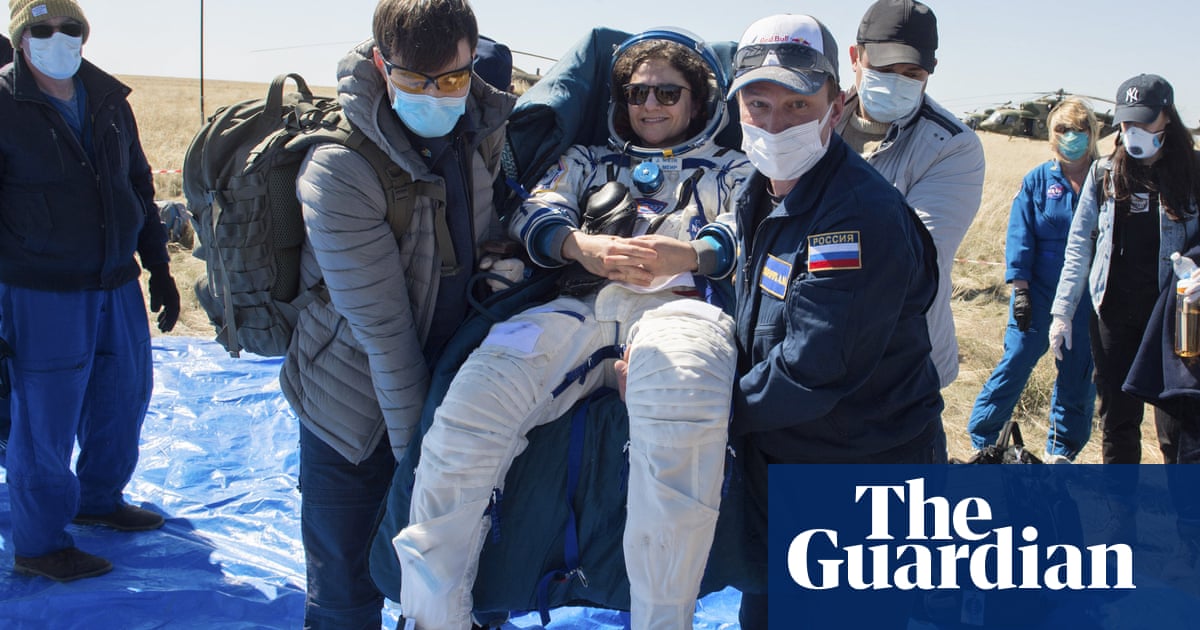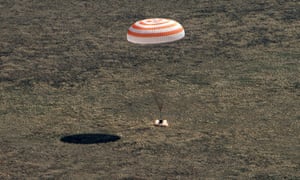American and Russian crew touch down in Kazakhstan after months on International Space Station

The three-person crew of the International Space Station returned to Earth on Friday morning, arriving back to a world that has been radically transformed by coronavirus in the time they were away.
Space travel is often a journey into the unknown, but for Americans Jessica Meir and Andrew Morgan, and Russian Oleg Skripochka, their return to Earth may bring more surprises than the time they spent in orbit. The trios landing capsule touched down on the Kazakh steppe in the early hours of the morning.
Morgan had been at the ISS for nine months, his first space mission, while Meir and Skripochka blasted off six months ago, back when shaking hands and hugs were still normal greetings, international travel was routine and there was not even a hint of the virus that would emerge in Wuhan and make its way around the globe.
The trio got an early hint of the new world they had arrived in as they were met by a recovery crew wearing face masks and rubber gloves, who pulled them out of their landing capsule. Russian officials said the team assigned to aid the crew had been under medical observation for a month, including tests for coronavirus. It was also cut to a minimum of essential personnel.
Please keep your distance, one ground crew member could be heard telling another, in footage released by Russias space agency.
Following the medical checkup, the crew boarded helicopters to Baikonur, the Russian launch site in the Kazakh steppe. From there, Skripochka will travel to Moscow. Morgan and Meir had a longer journey ahead of them: a nearly 200-mile drive to the city of Kyzylorda, and from there a flight back to the US. A closer airport has been closed to international flights due to the coronavirus.
Its a little bit difficult for us to feel like were truly going back to a different planet, Meir said in a television interview conducted when she was still aboard the ISS earlier this week.
We were really the only three humans that were not subject to that at the current time. Billions of humans were dealing with this in some way or another and the three of us werent.

Isolation and quarantine is not likely to be too challenging for the crew, who are used to the long months aboard the ISS. Meir said the best tips for surviving long periods of isolation were ensuring daily exercise, keeping a regular schedule, treating those around with kindness and making sure to have fun.
On Thursday, Russian officials reported the first case of coronavirus at Star City, the complex outside Moscow which serves as the control room and training hub for space flights. The director of Roscosmos, the Russian space agency, said on Wednesday that there are currently 30 cases of coronavirus among employees.
Even minor illnesses can be disastrous in space, with the Apollo 7 mission in 1968 severely hampered when one of those on board developed a cold soon after blastoff and quickly passed it to the others. For this reason, crews undergo a rigorous quarantine procedure for a month prior to departure.
Due to coronavirus, these procedures were made even stricter than usual for the new crew at the ISS, who blasted off from Baikonur last week. As well as daily medical checks, all living spaces were regularly chemically cleaned. The launch took place without the usual fanfare and guest attendances.
Astronauts Chris Cassidy, from the US, and Russians Anatoly Ivanishin and Ivan Vagner will spend six months on the ISS. Before blastoff, Cassidy said part of him was pleased to be leaving Earth at the most uncertain time in a generation.
[Its like] where were you when JFK was shot, where were you when we landed on the moon and where were you when coronavirus was happening, and Ill have my own interesting story to tell in years to come, he told the Associated Press.
Read more: https://www.theguardian.com/science/2020/apr/17/international-space-station-crew-return-to-earth


Recent Comments